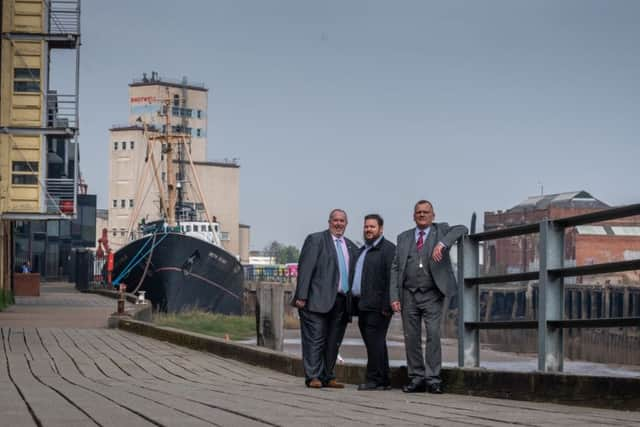How Hull is converting its maritime heritage into new investment – Emma Hardy
Our port industry was hit, 95 per cent of our houses were destroyed or damaged, and more than 1,200 people were killed in air raids on the city. Becoming the UK City of Culture in 2017 put Hull on the map for all the right reasons, and in 2019 the scale of our ambition has not diminished.
Advertisement
Hide AdAdvertisement
Hide AdThe UK City of Culture 2017 was an inspirational year: one of building confidence, showcasing our city, changing people’s minds and laying foundations for the future.


The project will take Hull to the next level as a destination renowned for its maritime heritage and culture. Hull’s rich maritime story will take centre stage, creating a long-term legacy for decades to come. The city has already surpassed expectations and changed the perceptions of many by presenting as proud, brave, confident, and outward-looking, transformed by investment in culture, people and place.
Advertisement
Hide AdAdvertisement
Hide AdOur connection with the sea has shaped our landscape and our culture; it touches every piece of our identity and shapes the way we see ourselves. Our fighting spirit, determination, and desire to resolve injustices has been evident through the ages, from William Wilberforce and his campaign to abolish the slave trade to the headscarf revolutionaries and their battle against the powerful establishment to change fishing safety laws.


The story of those women revolutionaries is quite extraordinary: their campaign started after the Triple Trawler disaster in 1968, when 58 fishermen based in the port lost their lives in three separate trawler sinkings in the space of less than a month.
Those women collected more than 10,000 signatures on a petition calling for reform, led protest meetings, and even came down to London to lobby politicians. Among the measures the campaign secured were safety checks before vessels left port, radio operators for all ships, improved safety equipment, and a mother ship with medical facilities for all fleets.
Advertisement
Hide AdAdvertisement
Hide AdToday, our connection to and affection for the sea continues to define Hull’s culture and economy. Maritime images dominated the City of Culture opening ceremony; The Deep aquarium remains one of our tourist hotspots; and thousands of people travel through our port each month to European cities such as Amsterdam or Zeebrugge, reflecting the European movement of the late 19th century, when trans-migrants made their way through Hull on their way to North America.


Our future economic prosperity remains tied to our future as a port and the green energy estuary – it often comes as a surprise when people learn that the Humber is Britain’s busiest trading estuary. Our maritime endeavours continue to this day.
The project is based around five key elements of our maritime heritage, which are Hull Maritime Museum, the Dock Office Chambers, the North End shipyard, and two ships: the Arctic Corsair, the sole survivor of Hull’s distant-water sidewinder trawler fleet, and the Spurn Lightship, which played a key role in Hull’s inland trade by guiding vessels as they navigated the Humber estuary. Both those ships will receive a full restoration, increased opening hours, a new interpretation and new displays, while the Arctic Corsair will also play host to a variety of training events and opportunities.
The extent of the renovation on the buildings is even more exciting. The project in the North End shipyard will commemorate how that site once contributed to Hull’s status as a global maritime port by housing the Arctic Corsair in a permanent dry berth. The Maritime Museum will receive an additional 390 square metres of museum space.
Advertisement
Hide AdAdvertisement
Hide AdHowever, Hull: Yorkshire’s Maritime City will redefine the city for residents and visitors alike and transform the life chances of its citizens. Across the city, the project will promote ambition and civic pride and will benefit 150,000 people through informal learning and outreach programmes.
I ask Ministers to recognise the ambition of Hull City Council in supporting such a project, and to encourage the Department for Digital, Culture, Media and Sport to work with the council to deliver this ambitious and aspirational project.
Emma Hardy is Labour MP for Hull West and Hessle. She led a Commons debate on Hull’s Maritime City Bid – this is an edited version.